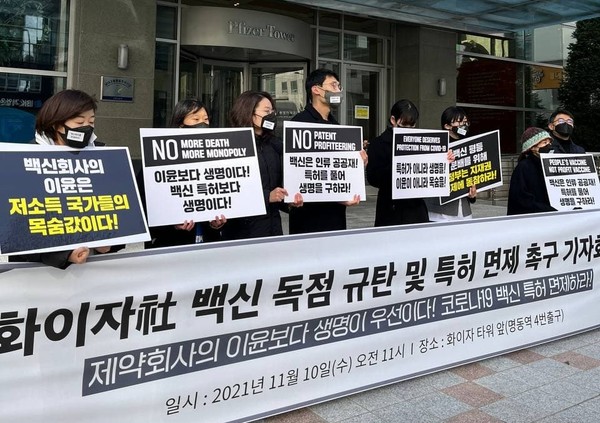Civic groups accused Pfizer of abusing power against governments over Covid-19 vaccine negotiations around the world.
The Korean government should disclose the vaccine purchase agreement signed with Pfizer, and the company should stop monopolistic sales of the Covid-19 vaccine and waive vaccine patents.

Korean Pharmacists for democratic society (KPDS) and other civic organizations held a press conference in front of the Pfizer Tower in central Seoul on Wednesday “to condemn Pfizer’s monopoly on Covid-19 vaccine and call for a vaccine patent waiver.”
The KPDS said Public Citizen, a U.S. consumer rights advocacy group, released a report that analyzed Pfizer’s contracts with nine countries.
“According to this report, Pfizer used its Covid-19 vaccine power to bully these countries in all kinds of ways,” the KPDS said.
More specifically, Pfizer demanded waiver of responsibility for supply delays, restriction of unauthorized vaccine donations, and taking public assets such as state-owned airliners and oil refiners as collateral in case of vaccine payment delays, the association said, citing the report.
The Public Citizen’s report also claimed that Pfizer threatened governments not to supply Covid-19 vaccines if they did not keep their deals secret.
The KPDS argued that Pfizer’s unfair practice caused greater pain and damage for normal people in low-income countries than in major countries. The group noted that only 2 percent of the populations in low-income countries had been vaccinated so far.
The KPDS said Pfizer had supplied 80 percent of Covid-19 vaccines to a few rich countries that could afford it, and only 0.1 percent of them to developing countries.
Because of this, the association said the lives of high-risk populations, including the elderly and healthcare workers in most low-income countries, were at risk.
“These pharmaceutical companies are taking advantage of their monopolistic position to make huge profits,” the KPDS said.
Pfizer’s Covid-19 vaccine will be the best-selling pharmaceutical product in history. Pfizer is forecast to earn 42.4 trillion won ($35.7 billion) in sales this year and 34.1 trillion won next year from selling the Covid-19 vaccine alone, it added.
Pfizer developed its Covid-19 vaccine using a phenomenal amount of government money but privatized its profits amid the unprecedented health crisis, the KPDS noted.
Mid- and low-income countries and civic groups have long demanded the WTO put a temporary waiver of vaccine patents to check the monopolistic power of vaccine developers. Still, affluent countries, including Japan and Europe, opposed it, saying they could not deter the profiteering of the vaccine companies.
The KPDS criticized the Korean government for not supporting the patent waiver proposal.
The KPDS urged the government to take three measures – to actively support the international proposal to waiver Covid-19 vaccine patents temporarily, to disclose contracts with vaccine makers transparently, and to push local vaccine developers to license out their vaccines to contribute to an increase of the global vaccine supply because they develop vaccines with tax payers’ money.
“On the international stage, the Korean government has asserted that vaccines are a public good in the infectious disease crisis and a fair vaccine supply was the fastest way to overcome the Covid-19 crisis,” the KPDS said.
To show that the government’s assertion was not lip service, the government should support the vaccine patent waiver proposal and check the monopoly of pharmaceutical companies in the public health crisis, it added.

